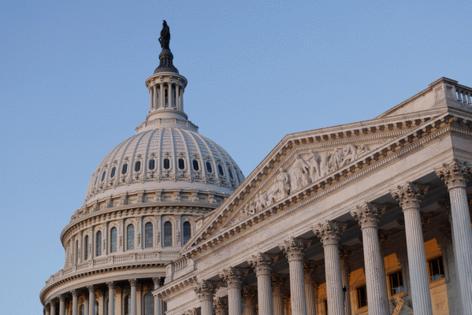Why Republicans are expected to take control of the Senate
Published in Political News
LOS ANGELES — Republicans are expected to retake control of the U.S. Senate, creating obstacles for Vice President Kamala Harris if she is elected president and a potential glide path for former President Donald Trump’s agenda if he wins the White House.
The GOP’s edge is created by a number of factors. Several of the Democratic senators up for reelection were initially elected during years favorable to their party, such as the 2006 backlash to then-President George W. Bush or during then-President Barack Obama’s successful 2012 reelection campaign — and are facing headwinds for the first time.
“The nature of the calendar of Senate elections almost always gives one party or other an advantage in every cycle. Democrats have a lot more seats up this year and so they’re working at a disadvantage,” said Dan Schnur, a politics professor at the University of Southern California, University of California, Berkeley and Pepperdine.
“One other way of looking at it is that 2018 was Trump’s first midterm election, and it ended up being a very good year for the Democrats,” Schnur added. “But now many of the senators who benefited from that climate six years ago are facing a much more difficult challenge this year.”
Additionally, Republicans recruited a number of wealthy candidates who have self-funded their campaigns or raised large sums of money. For example, Wisconsin Democratic Sen. Tammy Baldwin is being challenged by GOP Sen. Eric Hovde, who has put $20 million into his campaign, more than her last two rivals spent combined, said Jessica Taylor, the Senate and governors editor for the Cook Political Report, a nonpartisan analyst of races.
“Our current projection is Republicans picking up between two and five seats,” Taylor said.
Democrats currently control 51 seats of the 100-member Senate because the three independents in the body caucus with Democrats. Republicans control 49 seats.
Which states are the best pick-up opportunities for Republicans?
One of the Senate’s three independents is Sen. Joe Manchin III of West Virginia, who is retiring. Republicans are expected to easily win this open seat in a state Trump carried by nearly 70% of the vote in 2020.
Montana, where Republican businessman Tim Sheehy is challenging Democratic incumbent Jon Tester, is also expected to be a likely GOP pick-up. Sheehy leads Tester by an average of 6.5 percentage points in recent polling compiled by Real Clear Politics.
Ohio Democratic Sen. Sherrod Brown was also believed to be vulnerable in a challenge by Republican businessman Bernie Moreno. The race is in effect tied in recent polling. Democrats have been hammering Moreno over a statement he was caught making on camera saying abortion rights shouldn’t be an issue for women over age 50. Taylor points to a new Iowa poll that showed a Democratic shift among older women that could boost Brown if it is happening in Ohio.
What other states are being watched closely?
Wisconsin’s Baldwin has a 1.4-point edge over Hovde in recent polling, according to Real Clear Politics. Contests in Michigan, Pennsylvania, Arizona and Nevada have similar tight contests, though the two Western states show an interesting dynamic:
Democrats Rep. Ruben Gallego of Arizona and Sen. Jacky Rosen of Nevada have narrow leads over their Republican challengers, but both outpace how Harris is expected to do in their respective states.
GOP incumbents are facing notable challenges in the red states of Texas and Nebraska.
In Texas, GOP Sen. Ted Cruz holds a 4-point lead over Democratic Rep. Colin Allred in recent polling, but the race is tight for such a traditional Republican state.
In Nebraska, incumbent GOP Sen. Deb Fischer narrowly leads independent union leader Dan Osborn.
What does control of the Senate mean for the next president?
Schnur and Taylor agreed that a Republican-controlled Senate would allow Trump to enact the policies he has discussed throughout his campaign.
“If it’s a Republican Senate, you could certainly see Republicans passing a lot of Trump’s priorities — no tax on tips, tariffs, following his foreign policy guidelines,” Taylor said.
Schnur added that the filibuster would almost certainly be eliminated and the body would become “almost an assembly line” for Trump’s judicial nominees.
The exact opposite is true if Harris wins the White House, they said.
“If President Harris was given a Republican Senate, she would be the first president in almost 40 years not to take office with a Congress of the same party,” Schnur said. “So from Day One, it would be much more difficult for her to move her agenda forward.”
©2024 Los Angeles Times. Visit at latimes.com. Distributed by Tribune Content Agency, LLC.




























































Comments